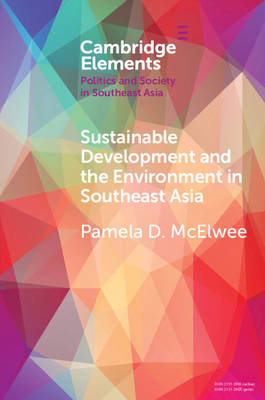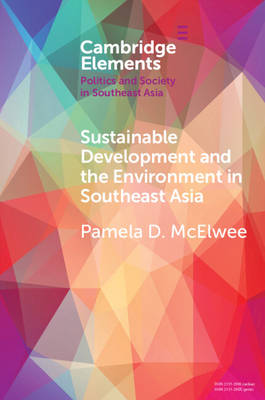
- Afhalen na 1 uur in een winkel met voorraad
- Gratis thuislevering in België vanaf € 30
- Ruim aanbod met 7 miljoen producten
- Afhalen na 1 uur in een winkel met voorraad
- Gratis thuislevering in België vanaf € 30
- Ruim aanbod met 7 miljoen producten
Zoeken
Sustainable Development and the Environment in Southeast Asia
Pamela D McElwee
€ 24,45
+ 48 punten
Uitvoering
Omschrijving
The rapid economic development experienced by Southeast Asia has come at the cost of considerable environmental degradation, including deforestation and land degradation, biodiversity loss, water and ocean pollution, rising greenhouse gas emissions, and increasing vulnerability to climate change. While sustainable development as a concept recognizes the fundamental importance of nature to future human well-being, the Sustainable Development Goals (SDGs) as a set of policies falls far short of this ideal. The SDGs, particularly the environmental goals relating to life on land, life under water, and climate action, are essentially impossible to meet in Southeast Asia, as no country is on a sustainability trajectory, but these goals are superficial and modest at best anyway. Alternative approaches that recognize trade-offs and seek to integrate across solutions, that create spaces for inclusion, and which center equity and justice could help meet SDG goals, but face considerable challenges in implementation across Southeast Asia.
Specificaties
Betrokkenen
- Auteur(s):
- Uitgeverij:
Inhoud
- Aantal bladzijden:
- 96
- Taal:
- Engels
- Reeks:
Eigenschappen
- Productcode (EAN):
- 9781108720533
- Verschijningsdatum:
- 25/09/2025
- Uitvoering:
- Paperback
- Formaat:
- Trade paperback (VS)
- Afmetingen:
- 152 mm x 229 mm
- Gewicht:
- 140 g

Alleen bij Standaard Boekhandel
+ 48 punten op je klantenkaart van Standaard Boekhandel
Beoordelingen
We publiceren alleen reviews die voldoen aan de voorwaarden voor reviews. Bekijk onze voorwaarden voor reviews.







